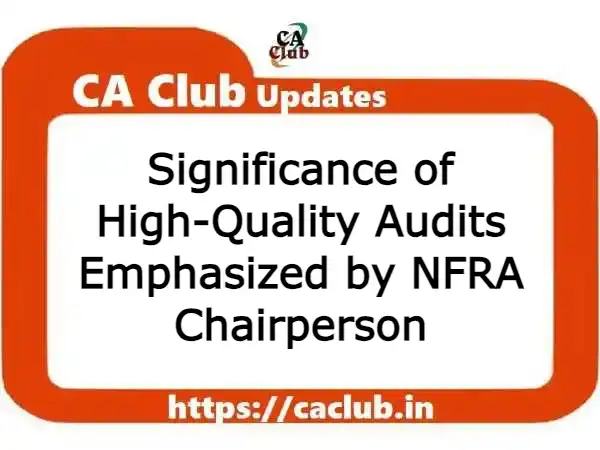In the realm of financial reporting and control, the National Financial Reporting Authority (NFRA) Chairperson, Dr Ajay Bhushan Prasad Pandey, delivered a significant address at the 3rd International Conference on recent developments and challenges in this domain. The conference, organized by ASSOCHAM, provided a platform for Dr Pandey to stress the importance of involving experienced individuals in audit committees to ensure high-quality audits.
Enhancing Investor Confidence through Financial Reporting and Audits
Dr Pandey’s speech centered around the vital role played by financial reporting and auditors in bolstering investor confidence within the Corporate Sector. As India has experienced remarkable success due to various groundbreaking reforms such as Digital Reforms like Aadhar, UPI, GST and Tax Reforms, he highlighted the role of the private sector and the audit of financial reports in the nation’s economic growth and development.
NFRA’s Efforts in Ensuring Audit Quality
Dr Pandey went on to elaborate on the recent efforts made by NFRA to uphold audit quality. One of the crucial messages emerging from the disciplinary orders issued by NFRA was the consideration of viewpoints from peer groups like PCAOB and FRC. These independent regulators possess decades of experience and serve as valuable resources in maintaining high standards in the audit profession.
Critical Areas Addressed by NFRA’s Disciplinary Orders
The disciplinary orders issued by NFRA have shed light on several critical areas that require attention for improving audit quality, which are as follows:
1. Evaluating Business Rationale
Auditors need to thoroughly evaluate the business rationale behind company transactions and business objectives. Standards on auditing emphasize the importance of understanding the entity’s operations and strategy to identify the risk of misstatements, detect fraud and assess related parties and transactions.
2. Handling Fraud Detection
NFRA highlighted the responsibility of auditors in addressing frauds within companies, as outlined in the relevant standards and laws. Dr Pandey pointed out that there exists a “mind-set” gap among auditors rather than an “expectation gap” of investors. It is essential for auditors to adhere to the prescribed standards and laws to enhance fraud prevention and detection. In this context, NFRA has issued a circular clarifying that auditors are required to report fraud, even if they are not the first to discover it and that fraud should not be ignored simply because the previous auditor has already filed ADT-4.
3. Ensuring Proper Audit Documentation
Modern auditing standards place heavy emphasis on the documentation of audit work. The underlying principle is that audit work papers should be comprehensive and self-explanatory, enabling anyone to understand the audit process, even in the auditor’s absence. Proper audit documentation fosters a “thinking audit” approach rather than a mechanical “ticking audit” process.
4. Avoiding Excessive Reliance on Experts
Auditors must avoid undue reliance on management’s or their own experts’ reports or opinions, as well as legal opinions. The appropriate audit checks prescribed under Standard Audits (SAs) should be followed diligently when evaluating reports on impairment loss, fair values and other critical areas.
The Role of Audits in Corporate Governance and Building Trust
Dr Pandey concluded by emphasizing the indispensable role audits play in corporate governance, particularly in building trust within the private sector. He highlighted the importance of strengthening the roles of Audit Committees and Independent Directors to further enhance transparency and credibility in financial reporting.
Remuneration for Auditors
Acknowledging the critical role auditors play in maintaining financial integrity, Dr Pandey stressed the need for suitable remuneration for auditors, ensuring their dedication to providing high-quality audit services.
In conclusion, Dr. Ajay Bhushan Prasad Pandey’s participation in the 3rd International Conference shed light on the crucial aspects of financial reporting and audits. His emphasis on involving experienced individuals in audit committees and addressing the critical areas highlighted by NFRA’s disciplinary orders will undoubtedly contribute to bolstering economic growth and fostering investor confidence in India’s Corporate Sector.
|
Disclaimer: While reasonable efforts have been made to ensure the accuracy and reliability of the information presented in this article, it should not be considered as professional advice or guidance. For compliance, the readers are advised to directly refer to the relevant laws, regulations and notifications issued by the appropriate authorities. |

 CA Abhinav Aggarwal is a qualified Chartered Accountant and ICAI member since 2010. He holds vast experience in Audit, Income Tax & GST and is a passionate writer on the CA profession and related topics.
CA Abhinav Aggarwal is a qualified Chartered Accountant and ICAI member since 2010. He holds vast experience in Audit, Income Tax & GST and is a passionate writer on the CA profession and related topics.
Thanks NFRA for endorsing the need of suitable remuneration for Auditors to maintain the quality of audits.